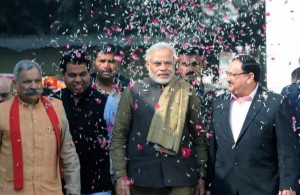With Narendra Modi set to assume office as India’s Prime Minister Monday, the US has expressed keenness to engage a man it had shunned for over a decade, following his “resounding” victory.
President Barack Obama was quick to acknowledge the Indian people’s mandate and effectively ended the visa ban on him for his alleged role or inaction during the 2002 Gujarat riots with an invitation to visit Washington. Secretary of state John Kerry “echoed” the invitation a couple of days later.
“We recognize the Indian electorate has weighed in with a resounding mandate for Prime Minister Modi and we want to work with him for advancing his goals for India as a regional and global player,” US assistant secretary of state for south central Asia Nisha Desai Biswal told reporters.
“The President stated definitely that we will be welcoming Prime Minister Modi. We, like rest of the world, have seen a remarkable election and a remarkable transition,” said America’s first Indian-American point person for the region.
“The mandate the Indian electorate put forward is one that we strongly support and we stand ready to engage and assist when the new government is ready,” she said.
Biswal, whose parents emigrated from Dahod in Gujarat, said Obama saw the Indian election in a very positive light and looked forward to welcoming Modi in Washington at the earliest opportunity. Kerry too is keen to travel to India.
“We have stated quite definitely that he will be welcomed here. That he will travel on A1 visa as a head of State, which is the appropriate category for all heads of State when they travel to the US,” Biswal said.
“We are eager to engage but we also don’t want to overwhelm the new government with our priorities and dates,” she said.
Although it’s Washington’s turn to hold the annual India-US strategic dialogue this summer, Biswal indicated that it was open to new dates and venues. “We are waiting to hear from new government about their preference,” she added.
Challenging doubts in some quarters about the future of India-US relationship, she said, “To say this is not a strategic relationship is categorically false; it is one in every way.”
Biswal also saw Modi’s invitations to the leaders of South Asian countries, including Pakistan, to attend his swearing-in ceremony Monday as “a strong and positive signal”.
“I certainly think that having the regional leaders come is a strong and positive signal. Beyond that I think, it is really for India and its neighbours to react and respond to,” she said.
Meanwhile, at a symposium organised by US India Political Action Committee (USINPAC) on Capitol Hill, Biswal again declared: “It is indeed a time for us to be looking forward and looking ahead.”
Several lawmakers from both sides of the aisle, including Republican chairman of House Foreign Affairs Committee Ed Royce, also expressed keenness to engage India.
